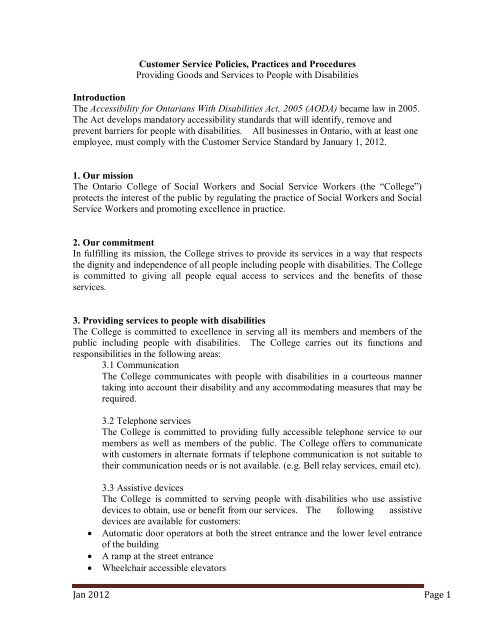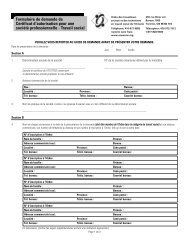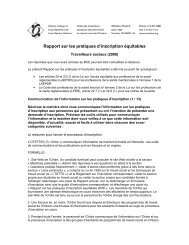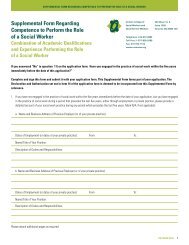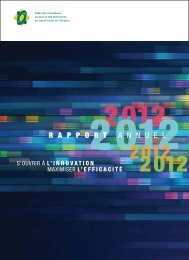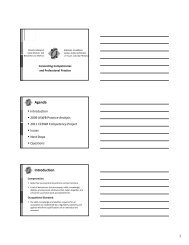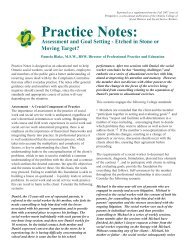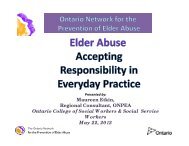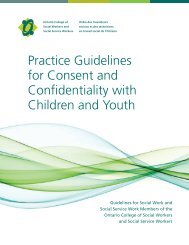Customer Service Policies, Practices and Procedures
Customer Service Policies, Practices and Procedures
Customer Service Policies, Practices and Procedures
You also want an ePaper? Increase the reach of your titles
YUMPU automatically turns print PDFs into web optimized ePapers that Google loves.
<strong>Customer</strong> <strong>Service</strong> <strong>Policies</strong>, <strong>Practices</strong> <strong>and</strong> <strong>Procedures</strong><br />
Providing Goods <strong>and</strong> <strong>Service</strong>s to People with Disabilities<br />
Introduction<br />
The Accessibility for Ontarians With Disabilities Act, 2005 (AODA) became law in 2005.<br />
The Act develops m<strong>and</strong>atory accessibility st<strong>and</strong>ards that will identify, remove <strong>and</strong><br />
prevent barriers for people with disabilities. All businesses in Ontario, with at least one<br />
employee, must comply with the <strong>Customer</strong> <strong>Service</strong> St<strong>and</strong>ard by January 1, 2012.<br />
1. Our mission<br />
The Ontario College of Social Workers <strong>and</strong> Social <strong>Service</strong> Workers (the “College”)<br />
protects the interest of the public by regulating the practice of Social Workers <strong>and</strong> Social<br />
<strong>Service</strong> Workers <strong>and</strong> promoting excellence in practice.<br />
2. Our commitment<br />
In fulfilling its mission, the College strives to provide its services in a way that respects<br />
the dignity <strong>and</strong> independence of all people including people with disabilities. The College<br />
is committed to giving all people equal access to services <strong>and</strong> the benefits of those<br />
services.<br />
3. Providing services to people with disabilities<br />
The College is committed to excellence in serving all its members <strong>and</strong> members of the<br />
public including people with disabilities. The College carries out its functions <strong>and</strong><br />
responsibilities in the following areas:<br />
3.1 Communication<br />
The College communicates with people with disabilities in a courteous manner<br />
taking into account their disability <strong>and</strong> any accommodating measures that may be<br />
required.<br />
3.2 Telephone services<br />
The College is committed to providing fully accessible telephone service to our<br />
members as well as members of the public. The College offers to communicate<br />
with customers in alternate formats if telephone communication is not suitable to<br />
their communication needs or is not available. (e.g. Bell relay services, email etc).<br />
<br />
<br />
<br />
3.3 Assistive devices<br />
The College is committed to serving people with disabilities who use assistive<br />
devices to obtain, use or benefit from our services. The following assistive<br />
devices are available for customers:<br />
Automatic door operators at both the street entrance <strong>and</strong> the lower level entrance<br />
of the building<br />
A ramp at the street entrance<br />
Wheelchair accessible elevators<br />
Jan 2012 Page 1
Elevators with visual indicators for up <strong>and</strong> down as well as floor numbers<br />
Wheelchair accessible washrooms<br />
Wheelchair accessible office premises<br />
Microphone system in Council Chambers.<br />
The College uses facilities for meetings <strong>and</strong> public events that are accessible for people<br />
with disabilities who use mobility aids <strong>and</strong> devices or have other facility-related needs.<br />
Members <strong>and</strong> members of the public are encouraged to contact the College to give as<br />
much notice as possible if accommodations are required.<br />
4. Use of service animals <strong>and</strong> support persons<br />
The College welcomes people with disabilities who are accompanied by a service<br />
animal <strong>and</strong> other third parties. The College ensures that all staff, volunteers <strong>and</strong> others<br />
dealing with the public are properly trained on how to interact with people with<br />
disabilities who are accompanied by a service animal.<br />
The College welcomes people with disabilities who are accompanied by a support<br />
person. Any person with a disability who is accompanied by a support person can enter<br />
the College premises with his or her support person. At no time will a person with a<br />
disability who is accompanied by a support person be prevented from having access to<br />
his or her support person while on the College premises. Support persons, may on<br />
occasion be required to sign confidentiality agreements depending on the specific<br />
circumstances.<br />
5. Notice of temporary disruption<br />
The College will provide notice in the event of a planned or unexpected disruption in the<br />
facilities or services usually used by people with disabilities. This notice will include<br />
information about the reason for the disruption, its anticipated duration, <strong>and</strong> a description<br />
of alternative facilities or services, if available. The notice will be placed outside the<br />
entrance to the College office. In addition, a notice will be posted on the College’s<br />
website.<br />
6. Training for staff<br />
The College will provide training to all employees, volunteers <strong>and</strong> independent<br />
contractors (“service providers”) who provide services to the public or other third parties,<br />
on behalf of the College.<br />
This training will be provided as soon as possible after an employee or service provider<br />
begins his or her duties with the College. All staff <strong>and</strong> service providers will be required<br />
to confirm that they have been trained on the College’s accessibility policies, practices<br />
<strong>and</strong> procedures. New employees will undertake training as part of their orientation as<br />
soon as practicable, unless they have previously undertaken equivalent training <strong>and</strong> are<br />
able to provide proof that they have completed this training. Staff <strong>and</strong> service providers<br />
Jan 2012 Page 2
will also be trained on an ongoing basis when changes are made to these policies,<br />
practices <strong>and</strong> procedures.<br />
Training will include the following:<br />
The purposes of the Accessibility for Ontarians with Disabilities Act, 2005 <strong>and</strong><br />
the requirements of the Accessibility St<strong>and</strong>ard for <strong>Customer</strong> <strong>Service</strong>.<br />
How to interact <strong>and</strong> communicate with people with various types of disabilities.<br />
How to interact with people with disabilities who use an assistive device or<br />
require the assistance of a service animal or a support person.<br />
What to do if a person with a disability is having difficulty in accessing the<br />
College’s goods <strong>and</strong> services.<br />
The College’s policies, practices <strong>and</strong> procedures relating to the customer service<br />
st<strong>and</strong>ard.<br />
The equipment or devices available on the College’s premises that may help serve<br />
persons with disabilities.<br />
Council members <strong>and</strong> non-Council Committee members will also receive online training<br />
regarding the College’s accessibility policies, practices <strong>and</strong> procedures.<br />
7. Feedback process<br />
The College’s ultimate goal is to meet <strong>and</strong> surpass customer expectations while serving<br />
members, or members of the public with disabilities. Comments on the College’s services<br />
regarding how well those expectations are being met are welcome <strong>and</strong> appreciated.<br />
Feedback regarding how well the College provides goods <strong>and</strong> services to people with<br />
disabilities can be communicated to the College via the College website by accessing<br />
“Evaluation of <strong>Service</strong>s for People With Disabilities” or by contacting Pat Lieberman,<br />
Manager of Council & Employee Relations, in person, by email at<br />
accessibility@ocswssw.org or by telephone at 1 877 828 9380 x 207. Where possible,<br />
complaints will be addressed immediately. However, some complaints may require more<br />
time to address <strong>and</strong> may require further review to determine the most appropriate course<br />
of action. The College will review all complaints <strong>and</strong> will provide a written response to a<br />
complaint within a reasonable period of time from the receipt of the complaint.<br />
8. Alternate Formats<br />
Upon request, the College will provide information in alternate formats (i.e. other ways<br />
of publishing information beyond traditional printing). Examples of alternate format<br />
include but are not limited to: hard copy, large print, Braille, audio, electronic text,<br />
captioning, descriptive video service <strong>and</strong> sign language interpreters.<br />
The College will consider specific format requests when sourcing alternate format<br />
materials. Please be aware not all documents will be readily available in every format. In<br />
addition, some text items do not lend themselves to certain alternative formats. If<br />
Jan 2012 Page 3
applicable, alternatives will be discussed with the individual requesting an alternate<br />
format. Please note that the College does not edit/convert alternate formats or e-texts. 9.<br />
9. <strong>Practices</strong>/<strong>Procedures</strong><br />
9.1. Assistive Devices<br />
<strong>Service</strong> provider should ensure people have unencumbered access to the assistive<br />
devices they bring with them.<br />
<strong>Service</strong> Providers will not operate or otherwise interfere with a person’s personal<br />
assistive device unless invited to do so by the person or his/her support person.<br />
As an example, do not move a wheelchair or cane without permission.<br />
<strong>Customer</strong>s should be informed of the availability of assistive devices, such as a<br />
telephone with hearing amplication, a lifting device or courtesy seating.<br />
Notification is best done through international symbols, posting plain-language<br />
signs with large, clear lettering, or by telling customers about them. Assistive<br />
devices provided on the premises should be in good repair <strong>and</strong> kept on a regular<br />
maintenance schedule.<br />
The College will ensure there is always someone on duty familiar with the<br />
operation of the device(s).<br />
9.2. <strong>Service</strong> Animals<br />
When it is not apparent that the animal is a service animal, a person with a<br />
disability may be asked to provide proof. Proof may be a letter from a doctor or<br />
nurse.<br />
<strong>Service</strong> Providers are never to pet or distract a service animal. These actions may<br />
distract the animal’s focus away from its owner <strong>and</strong> the owner’s comm<strong>and</strong>s <strong>and</strong><br />
cause a problem.<br />
If there is a dispute over a service animal such as an allergic reaction by another<br />
<strong>Service</strong> Provider or customer, managers are responsible to find a solution that is<br />
acceptable to all parties. The best solution will be one that respects each<br />
individuals’s right to a safe, secure <strong>and</strong> accessible work environment.<br />
<strong>Service</strong> Providers should be able to provide water or direct the owner of a service<br />
animal to an outdoor area where the animal can relieve itself.<br />
9.3. Support Persons<br />
Subsection 4(5) of the Accessibility St<strong>and</strong>ard for <strong>Customer</strong> <strong>Service</strong>s states that<br />
“the provider of goods or services may require a person with a disability to be<br />
accompanied by a support person when on the premises, but only if a support<br />
person is necessary to protect the health or safety of the person with a disability or<br />
the health or safety or others on the premises.” In these rare instances, the<br />
Jan 2012 Page 4
Manager of Council <strong>and</strong> Employee Relations must decide whether a support<br />
person is required. If no support person is available, the manager or<br />
designate must determine whether there is an acceptable alternative. One<br />
alternative may be to assign a member of the <strong>Service</strong> Provider team to<br />
accompany the person with a disability. Another option may be to reschedule<br />
services when appropriate arrangements can be made.<br />
Exercise of this authority must be based on clear evidence of a hazard to the<br />
person with the disability or others, if unaccompanied.<br />
A support person is not to pay an admission or other fee when a support person is<br />
necessary under subsection 4(5).<br />
10. Modifications to this or other policies<br />
The College is committed to developing customer service policies that respect <strong>and</strong><br />
promote the dignity <strong>and</strong> independence of people with disabilities. Therefore, no changes<br />
will be made to this policy before considering the impact on people with disabilities.<br />
11. Questions about this policy<br />
This policy exists to achieve service excellence to customers with disabilities. Any<br />
questions should be referred to Pat Lieberman, Manager Council <strong>and</strong> Employee Relations<br />
at 416 972 9882 x 207 or email plieberman@ocswssw.org<br />
Jan 2012 Page 5


